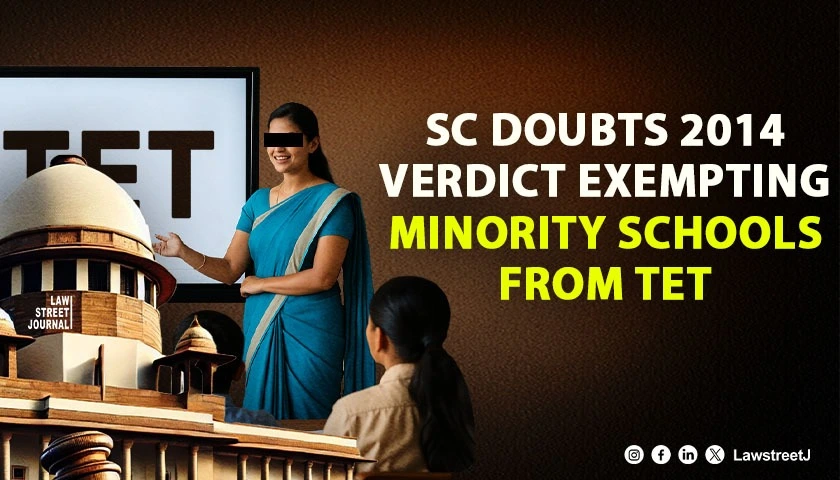NEW DELHI: In a significant judgment, the Supreme Court has expressed reservations over the correctness of the five-judge Constitution bench judgment in Pramati Educational and Cultural Trust which exempted minority educational institutions, whether aided or unaided, falling under clause (1) of Article 30 of the Constitution, from the purview of the entirety of the Right to Education Act.
In its 2014 judgment in case of Pramati Educational and Cultural Trust Vs Union of India, the Supreme Court has also held that Teachers Eligibility Test will not apply to minority institutions.
On a batch of matters arising from Maharashtra, Tamil Nadu and others, a bench of Justices Dipankar Datta and Manmohan held Article 30(1) has never been construed as conferring blanket immunity on minority institutions from all forms of regulation.
"With respect to unaided minority institutions, the interpretation of Article 30 must be guided by its underlying purpose of preserving the cultural, linguistic, and educational identity of minority communities and promoting their welfare," the bench said.
The bench underscored the mere admission of a “sprinkling of outsiders” neither defeats the purpose of Article 30 nor does it dilute or alter the minority character of such institutions.
"Article 30(1), in the context of aided minority institutions, is subject to the mandate of Article 29(2), which expressly prohibits denial of admission to any citizen in institutions maintained by the State or receiving State aid, on grounds of religion, race, caste, language, or any of them. An educational institution maintained by the State or receiving aid out of State funds cannot deny admission on, inter alia, grounds of religion," the bench said.
The court referred the matter to the Chief Justice of India to consider the questions framed by it to be adjudicated by the larger bench.
In its judgment, the court declared obtaining the TET qualification for teachers under the RTE Act is mandatory.
"In-service teachers (irrespective of the length of their service) would also be required to qualify the TET to continue in service," it said.
The court emphasised the provisions of the RTE Act have to be complied with by all schools as defined in Section 2(n) of the RTE Act except the schools established and administered by the minority – whether religious or linguistic – till such time the reference is decided.
In its directions, the bench said those teachers who have less than five years’ service left, as on date, may continue in service till they attain the age of superannuation without qualifying the TET.
Also Watch
"However, if any such teacher (having less than five years’ service left) aspires for promotion, he will not be considered eligible without he/she having qualified the TET," it said.
In respect of in-service teachers recruited prior to enactment of the RTE Act and having more than five years to retire on superannuation, the court declared they would be under an obligation to qualify the TET within two years from date in order to continue in service.
"If any of such teachers fail to qualify the TET within the time that we have allowed, they shall have to quit service. They may be compulsorily retired; and paid whatever terminal benefits they are entitled to," the bench said.
The court also framed questions for determination by a larger bench, including whether the RTE Act infringes the rights of minorities, religious or linguistic, guaranteed under Article 30(1) of the Constitution.
The court asked assuming that Section 12(1)(c) of the RTE Act suffers from the vice of encroaching upon minority rights protected by Article 30 of the Constitution, whether Section 12(1)(c) should have been read down to include children of the particular minority community who also belong to weaker section and disadvantaged group in the neighbourhood, to save it from being declared ultra vires such minority rights.
The court also asked as to what is the effect of non-consideration of Article 29(2) of the Constitution in the context of the declaration made in Pramati Educational and Cultural Trust that the RTE Act would not be applicable to aided minority educational institutions.
It also favoured authoritative pronouncement on whether, in the absence of any discussion in Pramati Educational and Cultural Trust regarding unconstitutionality of the other provisions of the RTE Act, except Section 12(1)(c), the entirety of the enactment should have been declared ultra vires minority rights protected by Article 30 of the Constitution.
The bench pointed out, Article 21A, which guarantees the right to free and compulsory education for all children aged 6 to 14, inherently includes the right to universal elementary education, that reaches every child, regardless of background.
"It also embraces the idea of a common schooling system, where children from diverse socio-economic and cultural groups learn together in shared spaces," the bench said.
Disclaimer: This content is produced and published by LawStreet Journal Media for informational purposes only and does not constitute legal advice. The views expressed are independent of any legal practice of the individuals involved.















